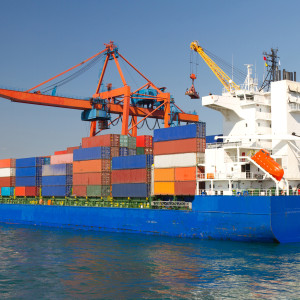The latest data continues to indicate that the U.S. economy is still struggling to get back on its feet. Though the most recent jobs report from the Bureau of Labor Statistics told us that the unemployment rate has decreased, the reason behind this is hardly cause for optimism.
The labor force participation rate (LFPR) has dropped to its lowest levels since the 1970s, which means that many Americans have simply given up looking for work. More than 800,000 Americans left the labor force last month, a troubling sign for any economy.
Even more intriguing is the recently-released data on international trade. U.S. exports and imports both increased in March, a late surge that could be encouraging. Total exports for March came to $193.9 billion, up 2.1 percent from February. Imports jumped 1.1 percent to $234.3 billion, the highest level seen since 2012. All told, the U.S. trade deficit fell 3.6 percent and now hovers at $40.4 billion. More trade means more economic activity which benefits taxpayers and consumers.
While the uptick in March trade numbers may be a promising sign that the economy is picking up steam as we head into the second quarter of 2014, it might not be quite enough steam. While the trade deficit narrowed, it didn’t narrow as much as the Commerce Department had estimated, meaning the entire economy likely still shrank in the first three months of this year.
This economic analysis sounds like a lot to wade through, but the takeaway is simple – U.S. trade is gaining momentum, slowly but surely, and it needs a leg up. Luckily, there’s a handy tool available that could unleash the country’s full trading potential and improve our economy including job creation. If Congress were to pass legislation granting Trade Promotion Authority (TPA) to President Obama, that would expedite the process for several international trade agreements currently under negotiation. Regrettably, TPA is being held up by petty politics, which means these agreements are being held up as well.
One such agreement is the Trans-Pacific Partnership, an agreement between the U.S. and eleven other nations that share Pacific Ocean coastline. One such nation is Canada, already our largest trading partner. In March, U.S. exports to Canada hit a record high, and it is important to keep this momentum going. Once Congress passes TPA, negotiators can advance TPP and increase Canadian trade even further.
On the other side of the world, the U.S. and E.U. are working together to hammer out the Transatlantic Trade and Investment Partnership or TTIP. American trade with the E.U. already generates nearly $3 billion of economic activity every day and another record number of exports was achieved with Germany. German Chancellor Angela Merkel even visited the White House recently and reiterated that it was “very important” that TTIP discussions come “very quickly to a close.” Congress passing TPA would give TTIP an important boost, so that the United States can do more business with Germany and other E.U. nations.
The President remains committed to these trade agreements. In his joint press conference with Merkel, he called TTIP “critical to supporting jobs and boosting exports in both the United States and in Europe.” He made similar comments on the Trans-Pacific Partnership during his recent visit to Asia. Unfortunately, Democratic leadership in Congress is less enthusiastic. House Democratic Leader Nancy Pelosi has said that passing TPA was “out of the question.” It makes no sense that the President can’t lean on members of his own party to pass legislation that Congress has dealt with regularly since the 1930s.
One possible answer is the outsized influence of labor unions. Big Labor bosses are not known to be friendly toward international trade, because it stands in the way of their efforts to create fiefdoms over domestic industries. Politicians in the pockets of these unions certainly appear to be the ones holding up TPA.
Whatever the reason, Congress needs to stop stalling and pass TPA. Boosting trade around the world will give us the momentum we need to grow our economy and create more jobs at home. The good news is that this is one of those few issues most Republicans and Democrats agree upon.
Taxpayers and consumers need for obstructionist Democrats to get out of the way and move forward with expanded trade authority.

